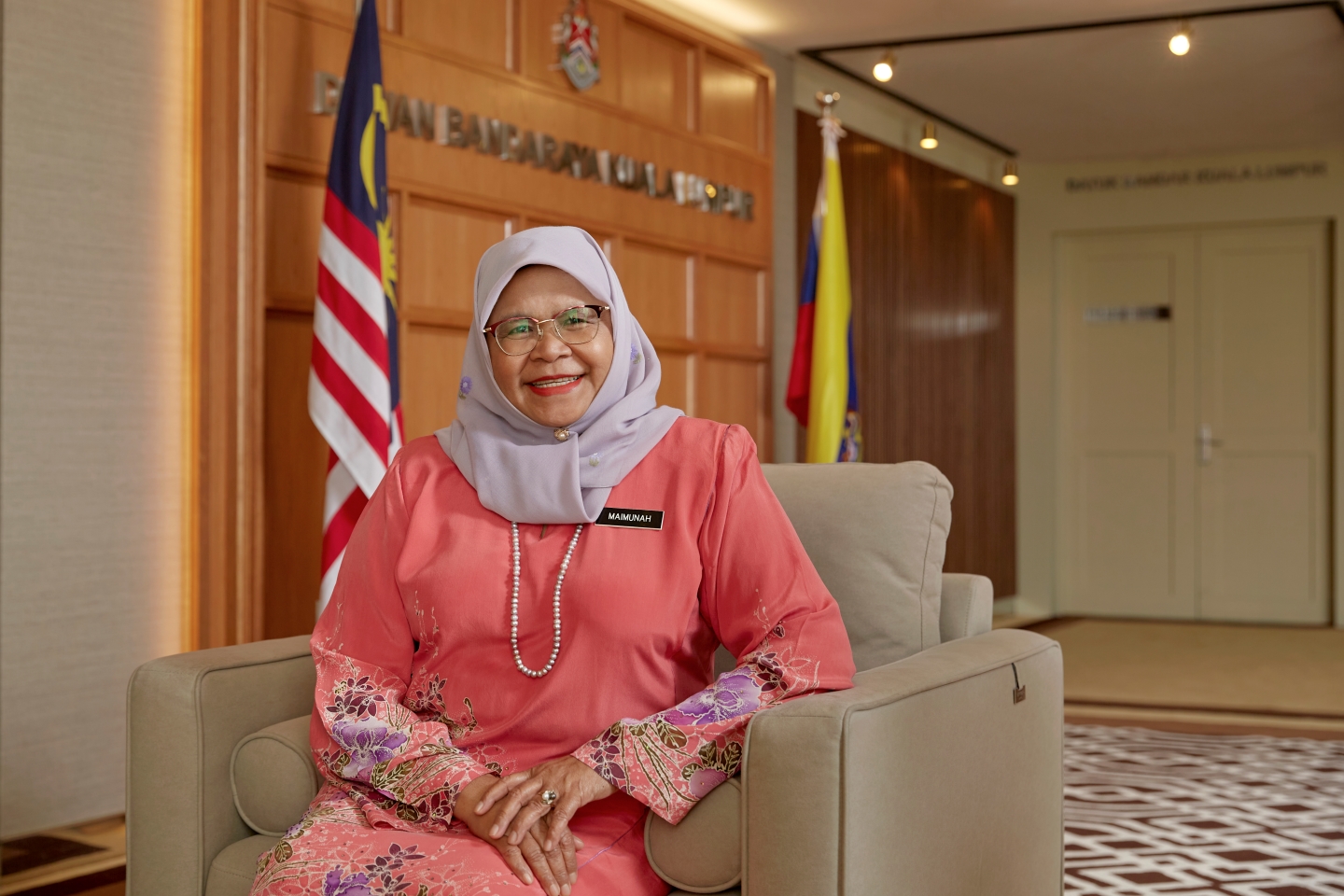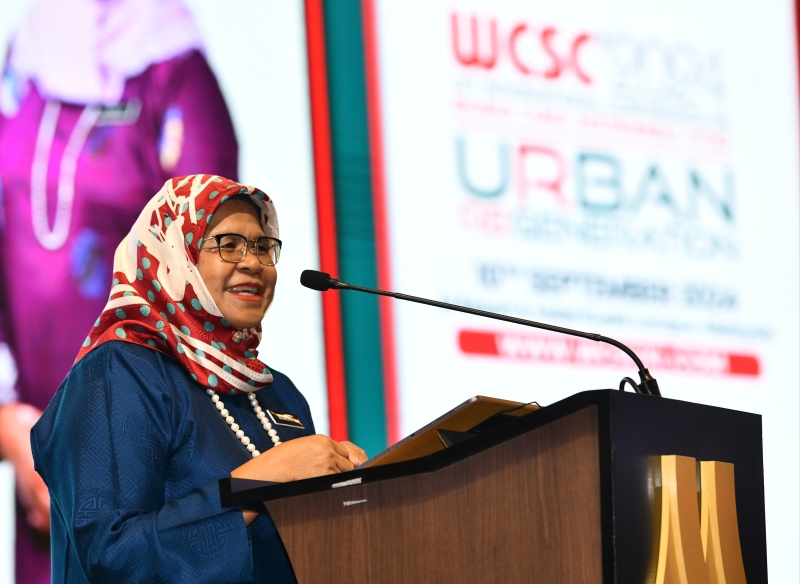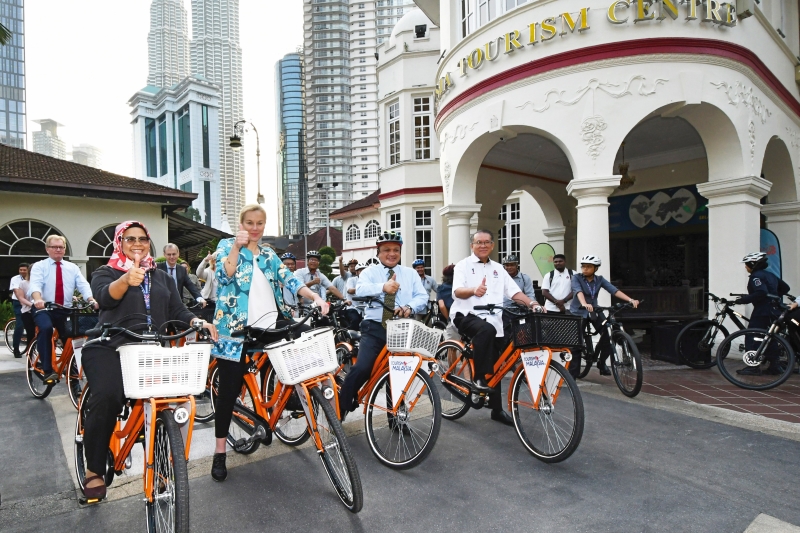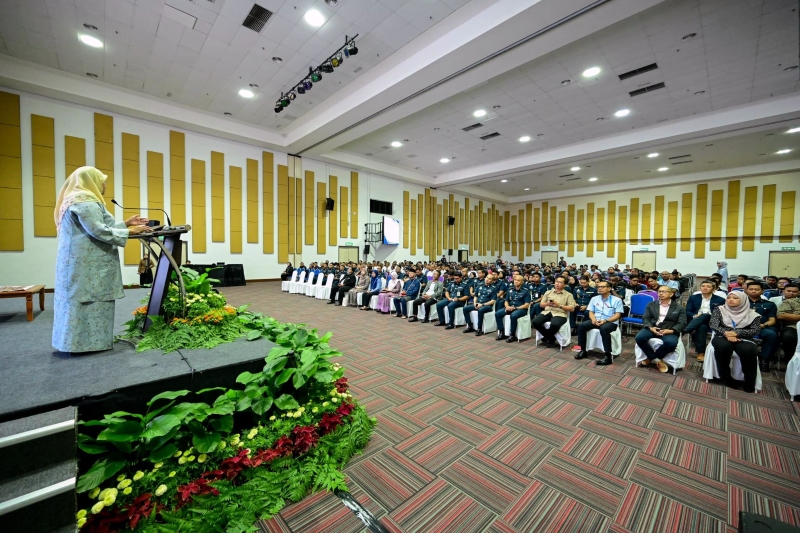
Maimunah: If you look at problems from a positive point of view, you would already have solved it by half (Photo: SooPhye)
The importance of taking stock of the first 100 days in a new job seems to be a relatively recent corporate pursuit. To paraphrase the old cricketing adage, scoring a century sets the tone for an incoming leader’s tenure, a foretelling of the days to come … almost. For Datuk Seri Maimunah Mohd Sharif, appointed by Prime Minister Datuk Seri Anwar Ibrahim as the 15th mayor of Kuala Lumpur on Aug 15, 2024, for a two-year term, tough starts lead to good endings. Case in point? Her childhood days.
Of grit + growth
Born on Aug 26, 1961, the second of six children to rubber tapper parents, Maimunah says, “Whenever I talk about my childhood, the orang kampung will always tell me to say the village’s name out loudly and clearly — Kampung Sungai Dua Besar, Kuala Pilah, Negeri Sembilan (she enunciates in staccato) — as they want people to know and remember it. They call me ‘their pride’.”
Looking around at the 28th floor of Menara DBKL, her office perched at the very peak of the Kuala Lumpur City Hall building, Maimunah’s story to the top is one of grit, grace and flourishing growth. Capable, action-oriented and blessed with the ability to effortlessly engage with people from all walks of life and backgrounds, the city’s first lady mayor is more than the pride of Kuala Pilah.
Big names from the corporate and professional sectors, whose work creates wealth and employment or impacts the city in positive ways, are equally effusive in their praise. Bigwigs like Datuk Seri Azmir Merican, group managing director and CEO of Sime Darby Property, laud the datuk bandar of KL as “a leader with her finger on the pulse of what needs to be done for the city. Her approachable nature, willingness to listen and clear understanding of the challenges and opportunities presented by KL reflect her commitment to shaping a vibrant and thriving capital for the benefit of both KL-ites and Malaysia as a whole”.
Meanwhile, Princeton-educated architect Lillian Tay of Veritas Design Group considers “Mayor Maimunah Sharif a person of her word who says what she means and means what she says. Approachable and down-to-earth, she somehow also finds ways to be expedient while never straying from proper procedure and has definitely set out to do as much, if not more, than her predecessors. I look forward to the new initiatives she will surely introduce for Kuala Lumpur”.
For a young girl who had to help her parents tap rubber before sunrise and then walk 5km to and from school each way, no one would deny that Maimunah has come a long way. Now 63, her face still lights up at the memory of receiving her first proper pair of school shoes 50 years ago, a hard-earned gift from her father when she agreed to do an extra year of schooling.
“My dad was far-sighted and he wanted to enrol me in an English-medium school. This meant spending one more year in remove class (a local term used to describe the compulsory attendance of a year-long transition class to ensure students are up to speed in the subject language). When I agreed, he bought the shoes for me. And they weren’t even Bata, mind you, but Fung Keong,” she chuckles, referring to the eponymous brand founded by a Chinese migrant who set up a factory in Seremban — the popular choice among lower-income earners then. “Before that, I survived with plastic shoes as all it needed was a quick wipe. You see, we didn’t have tarred roads in our kampung then. It was all tanah merah, laterite. Canvas shoes would just get kotor … hancur.”
20240910_peo_wcsc_2024_msy_4.jpg

Learning to fly
Maimunah attended Kolej Tunku Kurshiah and was among the last batch of students to sit for the Malaysian Certificate of Education (conducted in English) before it was discontinued and replaced by the Malay-medium Sijil Pelajaran Malaysia. After her Form Five examinations in 1979, she earned a scholarship from the Rubber Industry Smallholders Development Authority. “Because my parents were rubber tappers,” she explains. “It’s embarrassing to tell you this, but I stood on an escalator for the first time when I accompanied my dad to the Risda office.”
Two tertiary options were presented to her: Universiti Kebangsaan Malaysia in Bangi, Selangor, or the UK. “It was because of my cousin brother,” she says, grinning at the memory. “He was already in England, doing his A-Levels and encouraged me to go to London. He told me: ‘You can visit Buckingham Palace. You can ride on a red double-decker bus. You can see snow.’ He got me at that. I chose to study town planning, all because of snow.”
She tells a heartwarming story when winter arrived. “I was then studying in Bournemouth where it rarely snows. I had to attend a gathering in Nottingham, probably in the winter of ’80 or ’81, when it finally snowed! I remember how happy I was. Do you know what I did? I gathered it up like a ball in my hands, saying this was my ais kepal (the Malaysian variation of the classic snow cone),” she recalls happily. “I even stuck out my tongue to taste fresh snow!”
Another memory that would melt even the stoniest of hearts was her send-off. “Our whole kampung is very close. Everyone knows everyone,” she says. “The whole village got together and pooled their money to rent a bus, so they could all come send me off at the old Subang airport. KLIA (Kuala Lumpur International Airport) hadn’t been built yet. In fact, when news broke that I got the scholarship and was going abroad to study, the entire kampung began celebrating. My father held a kenduri and everyone brought something: some brought coconuts, others brought rice. Everyone shared our joy.”
It was amid this happiness that Maimunah resolved to be brave, work hard and not lose focus. “Once I left the country, I did not return for five whole years. Not even for summer,” she shrugs. “It was my first time out of Malaysia, leaving a tight-knit community. I was all alone — and well aware [that I was] on a scholarship. I owed it to my father, my family, to fend for myself and achieve the grades.”
She shares that her father would mail her an aerogramme every week, without fail. “Even before I opened it, I knew what he would say. It would always be along the lines of ‘take care of yourself’, ‘please study hard’, ‘we are from a poor family’ and ‘bring the certificate back’. And those words would give me a boost as I wanted to change my family’s circumstances and I knew I could do it with an education.”
She adds how she would send £50 from her monthly scholar’s allowance home to her father. “And when I graduated, I came straight home to Malaysia, not even staying for my convocation, as I wanted to quickly return, work and start taking care of my other siblings.” She now holds a Bachelor of Science in town planning from Wales as well as a Master of Science, in the same subject, from Universiti Sains Malaysia.
The city never sleeps
It appears two things are always asked of the mayor by non-KL folk: Is it flooding? What’s the traffic situation like? “I am well aware of these issues,” she says, “but another top priority for me is cleanliness. Yes, the city looks good but go deeper, where the back lanes are, and there’s still a lot of work to be done. My plan for KL is to be ‘Clean and Green’. The lack of cleanliness is invariably linked to flooding, as trash clogs drains and whatnot. We have identified 37 flood hotspots and I have challenged my engineers to halve the number by year end.”
Tackling pressing problems inadvertently involves people and education. Litterbugs, hard to believe, are still prevalent in this day and age. “And that is why I have put in a tagline: ‘A Liveable & Loveable Kuala Lumpur’. After all, if you love your house, you won’t dirty it, will you?” She cites a particularly inspiring visit to South Korea where she discovered Seoul Mayor Oh Se-hoon’s brand new slogan “Seoul, My Soul”, which incorporates pictograms of a heart, smile and exclamation mark to represent the love residents and people from around the world have for the city, fun places of attraction, and diversity as well as new experiences.
Seoul’s success with the urban renewal of Cheonggyecheon, which saw the disassembling of an elevated expressway to restore a waterway that is now teeming with fish and a beautiful natural habitat right in the heart of the city, has earned it an A-star from residents and visitors alike, and also encouraged Maimunah to turn her attention to our own ambitious but struggling River of Life project. “We want at least a 7km pavement people can easily walk along… that will be fantastic. But we are lacking activities there which would attract people to come and use the facilities. Community engagement is needed to really bring things back to life.”
20180209_peo_cycling_kuala_lumpur_6_lyy_tep.jpg

Smart cookie
With a role that is best described as “CEO of the city”, Maimunah’s key points of focus include dealing with housing and homelessness as well as inclusivity — all pertinent issues in one of Southeast Asia’s fastest-growing urban hubs. Besides her mayoral duties, she also serves as Malaysia’s special envoy for sustainable urbanisation and is a member of the International Advisory Committee to the
COP29 Presidency on urbanisation and climate change. Prior to this, she was mayor of the Penang Island City Council, the first woman president of the Seberang Perai Municipal Council, as well as undersecretary general of the United Nations and executive director of the UN Human Settlements Programme (UN-Habitat) from 2018 to 2024, a position that saw her being based in Nairobi, Kenya.
Beginning her career as a town planner at the municipal council of Penang in 1985, she was promoted to director of planning and development in 2003, responsible for the preparation of structure and local plans, development control of city projects on the island as well as landscape development. In 2009, she was entrusted as the first general manager to establish George Town World Heritage Inc and manage the George Town World Heritage Site inscribed by Unesco the year before. Her accolades include being named Malaysia’s Outstanding Urban Planner by the Ministry of Housing and Local Government and serving as an ambassador for King Charles III’s foundation for sustainable urbanisation in Commonwealth countries.
A hundred per cent action-oriented by nature, Maimunah will happily direct any visitor’s attention to huge charts and posters depicting her clear, well laid out plans with distinct key performance indicators (KPIs). Flagship programmes, for example, include Plan-Led Development (to lay the groundwork for advanced urban planning as well as safeguard a structured development for the city), Inclusive Communities (to improve liveability, ensure enough rental homes for low-income groups and upgrade hawker centres and markets), Green & Sustainable City (to reduce carbon footprint and increase green spaces per capita across KL), Communications (to improve strategic communications and implement a structured approach to efficiently manage public complaints) and Governance (to increase DBKL’s credibility via an integrated view of key performance and financial data).
“I have always maintained that we are the people we serve,” she asserts. “I like making things easier and simpler. Even topics as complex as climate change, we need to think about how to make them relatable to the layman.”
No wrong door policy
Going back to how Maimunah completely bucks the trend by turning rough starts into smooth finishes, she pauses for a moment before tackling the awkward subject head-on. “Yes, it is true that my first weeks [as KL mayor] were challenging: from flash floods to landslides and then the sinkhole,” she says, referencing the Aug 23 incident at Jalan Masjid India, where an Indian tourist fell into an 8m deep crevice. Her remains were never found, causing the government to declare her legally dead on Sept 1. “I had to face the tragic loss of a lady, Vijaya Lakshmi Gali. We had a fire break out at PPR Gombak Setia. I always tell myself to hit the ground running, but there is no doubt, I was severely tested,” she adds somberly. “Initially, I wanted to spend the first few weeks getting to know the different Acts, my colleagues ... of course, everything had to change quickly and I had to learn at the speed of light.”
While lesser mortals might have crumbled under the pressure, Maimunah handled the crises with grace and a resolve to do better. “I realised I need to know as much as I can about DBKL and as fast as possible. In September itself, I led an internal workshop with our senior leadership people. I always claim to be an action-oriented person. So, yes, we have the strategies and the plans. But it is always about how to implement them as well as convert the policies into on-the-ground action, all of which must benefit the people we serve. Even during my time at the UN, that was always my mantra. The tragic sinkhole incident taught us a lesson in proper maintenance and monitoring of public amenities whereas the floods and landslides are related to extreme climate events. Risk management is now a permanent feature in how we manage the city. DBKL has a war room to track and respond immediately to extreme weather and emergencies.”
Gutsy is also an ideal adjective to describe the mayor. When she held her first meeting with the media, a reporter stood up and asked, “Datuk Bandar, you said there is no wrong door policy in your administration. So, can you give us your handphone number?” And no prizes for guessing she did just that. “I said it out loud — all seven digits plus mobile phone code. Then I asked her, ‘You got it? If not, I will read it out once more’,” she laughs.
Asked if it was a bad move, seeing as she would be inundated with calls and messages from that moment on, Maimunah says matter-of-factly: “I did the same when I was in New York. Ed, my executive director then, said I was crazy. But I challenged him back, saying why not? We are the people we serve. And if they need to contact us, they should.”
To tick everything off on her never-ending to-do list, Maimunah has a system down pat: All queries and concerns would be forwarded to her respective work groups before the day winds down. “Like today, for example; I would already have received every piece of news about DBKL in the media by 7am — be it in the international or local English, Bahasa, Chinese and Tamil media.” Such affirmative action is part of Maimunah’s overarching strategy to make KL a city for all.
“Beyond being the capital city, we are also the hub for economic growth, financial institutions, R&D, knowledge and more. To ensure people look to us as a source of urban solutions, versus problems, I have introduced the four Ps: Public, Private, People, Partnership. I don’t want people to just participate. I want them to fully engage with us, so that when we do the work, there will be less resistance as the public already have a buy-in from us plus a sense of belonging. We must not forget that cities thrive because of their people, and not just infrastructure.”
dbkl.jpg

Putting things in perspective
Maimunah is married to Adli Lai, and the couple have two daughters — Amira (31) and Atira (26). She proudly shares that they have been blessed with a grandson who is 1½ years old. “I make it a point to remind my girls how lucky they are,” she points out. “They were born in an air-conditioned room, brought back from the hospital in an air-conditioned car and were taken straight to a room which had a baby cot ready. So, I always tell them two things: don’t complain and don’t be complacent. I remember how my father would always make us pray together as a family and we played all the time with our cousins, our neighbours. So, we must remember to engage with each other and not lose all these precious, human things.”
Maimunah also takes the opportunity to share her simple recipe for life: “Be hungry for knowledge, not food,” she laughs. “Be a good person. Have a good heart. I admit the environment, especially for young people, is different and has its own challenges today. But if you look at problems from a positive point of view, well then, you have already solved it by half. If you have a negative mindset, you have 100% to go,” she smiles. “My childhood was tough. We had to fetch and carry water, and there was no electricity. If it rained and my father couldn’t go out to tap rubber, only then could he take me to school. And it was on a bicycle. Not a car, ya? We didn’t have one.”
With a life built on grit and grace, it would seem the lady mayor is just getting into the swing of things. Suffice to say the public would not remember much of her strife-filled start and instead can soon look forward to reaping the benefits of her gutsy leadership and good governance. As Tay rightfully observes: “Maimunah combines fast action and attention to detail. You may expect her to fix all systems she deems deficient. I am confident our lady mayor will indeed make a difference and leave a mark, a positive one, on our city.”
It appears those days are already here.
This article first appeared on Feb 3, 2025 in The Edge Malaysia.


